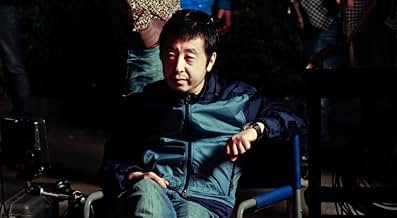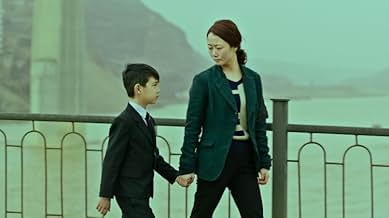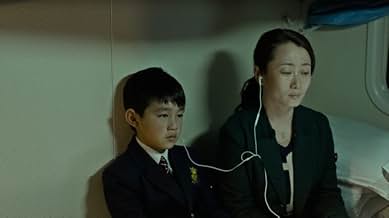IMDb RATING
6.9/10
6.6K
YOUR RATING
The life of Tao, and those close to her, is explored in three different time periods: 1999, 2014, and 2025.The life of Tao, and those close to her, is explored in three different time periods: 1999, 2014, and 2025.The life of Tao, and those close to her, is explored in three different time periods: 1999, 2014, and 2025.
- Awards
- 26 wins & 42 nominations
Yi Zhang
- Zhang Jinsheng
- (as Zhang Yi)
Zijian Dong
- Zhang Daole aka Dollar
- (as Dong Zijian)
- Director
- Writer
- All cast & crew
- Production, box office & more at IMDbPro
Storyline
Did you know
- TriviaSome sequences (in the 1999 segment) were filmed by the director and the cinematographer back in 2001.
- GoofsThe young boy who plays Tao's son in 2014 is also part of the crowd of children that watches her perform at the new year's celebrations in 1999.
- Crazy creditsThe title appears more than forty minutes after the beginning of the movie.
- SoundtracksGo West
Written by Henri Belolo, Jacques Morali and Victor Willis, Neil Tennant and Chris Lowe
Performed by Pet Shop Boys
Featured review
Director Zhangke Jia is not afraid to tackle the problems of modern China, and 'Mountains May Depart' is no exception. The film touches upon issues such as growing inequality, poor working conditions and corruption, but the central theme is the price the country is prepared to pay for its obsession with material progress.
The film is set in Fenyang, a northern coal mining city and the director's hometown. In 1999, at the eve of the new millennium, eighteen year old Tao (played by the director's wife Tao Zhao) has to choose between two suitors: the honest but ordinary coal miner Liangzi and the flashy bragger Zhang. She sees right through Zhang's bravado, but can't resist the promise of a better life, symbolized by his red Volkswagen, 'perfect for the next century'. Liangzi feels humiliated and leaves town.
Fifteen years later, Tao is well-off, but divorced and unhappy. Her seven year old son is living the good life with his father in Shanghai. Liangzi, in the mean time, is terribly ill and returns to Fenyang. Filled with remorse, Tao helps him financially but doesn't seem to be able to relate to him on an emotional basis.
Flash-forward another ten years into the future, and Tao's son is living with his father in Australia. He had to leave China, it turns out, because of anti-corruption campaigns. The boy is a spoilt and clueless brat, who refuses to speak Chinese to his father, but finds some emotional warmth with his Chinese teacher.
The first two parts of the film are excellent. Tao's moral choices, the contrast between progress and tradition, the power of money - it's all shown in a beautiful heartfelt way. The director anchors the story with recurring images, like a tall pagoda on the banks of the Yellow River, and spices it with small symbolic items like dumplings and keys. An interesting feature is the changing aspect ratio: in the first episode the screen is almost square, and it widens until it is widescreen in the last episode. Another feature is the way dialogues are filmed: repeatedly the director frames only one participant. And a third peculiarity are some high-impact scenes without a clear meaning or function in the story: a crashing military plane, a coal truck losing some of its cargo, a nervous caged tiger.
The sad thing about this movie is that the third part is very different from the first two parts, and lacks the quality of it. Not only are we introduced to different protagonists, also in this part the dialogue and acting are clumsy and unnatural, the story lacks focus and the scenes seem pointless. It's as if the director loses his golden touch when the story leaves China.
Still, in this last episode, the message is hammered home: the strive for material wealth leads to emotional poverty.
The film is set in Fenyang, a northern coal mining city and the director's hometown. In 1999, at the eve of the new millennium, eighteen year old Tao (played by the director's wife Tao Zhao) has to choose between two suitors: the honest but ordinary coal miner Liangzi and the flashy bragger Zhang. She sees right through Zhang's bravado, but can't resist the promise of a better life, symbolized by his red Volkswagen, 'perfect for the next century'. Liangzi feels humiliated and leaves town.
Fifteen years later, Tao is well-off, but divorced and unhappy. Her seven year old son is living the good life with his father in Shanghai. Liangzi, in the mean time, is terribly ill and returns to Fenyang. Filled with remorse, Tao helps him financially but doesn't seem to be able to relate to him on an emotional basis.
Flash-forward another ten years into the future, and Tao's son is living with his father in Australia. He had to leave China, it turns out, because of anti-corruption campaigns. The boy is a spoilt and clueless brat, who refuses to speak Chinese to his father, but finds some emotional warmth with his Chinese teacher.
The first two parts of the film are excellent. Tao's moral choices, the contrast between progress and tradition, the power of money - it's all shown in a beautiful heartfelt way. The director anchors the story with recurring images, like a tall pagoda on the banks of the Yellow River, and spices it with small symbolic items like dumplings and keys. An interesting feature is the changing aspect ratio: in the first episode the screen is almost square, and it widens until it is widescreen in the last episode. Another feature is the way dialogues are filmed: repeatedly the director frames only one participant. And a third peculiarity are some high-impact scenes without a clear meaning or function in the story: a crashing military plane, a coal truck losing some of its cargo, a nervous caged tiger.
The sad thing about this movie is that the third part is very different from the first two parts, and lacks the quality of it. Not only are we introduced to different protagonists, also in this part the dialogue and acting are clumsy and unnatural, the story lacks focus and the scenes seem pointless. It's as if the director loses his golden touch when the story leaves China.
Still, in this last episode, the message is hammered home: the strive for material wealth leads to emotional poverty.
- How long is Mountains May Depart?Powered by Alexa
Details
- Release date
- Countries of origin
- Official site
- Languages
- Also known as
- 山河故人
- Filming locations
- Fenyang, Shanxi, China(Tao's home town)
- Production companies
- See more company credits at IMDbPro
Box office
- Gross US & Canada
- $82,913
- Opening weekend US & Canada
- $5,550
- Feb 14, 2016
- Gross worldwide
- $5,215,660
- Runtime2 hours 6 minutes
- Color
- Sound mix
Contribute to this page
Suggest an edit or add missing content


























